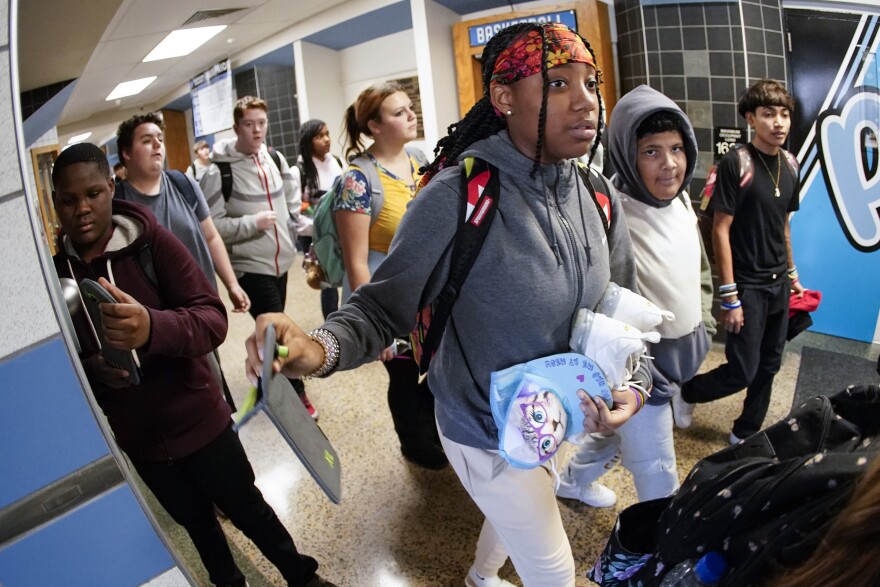Education
Pennsylvania Schools Debate Cellphone Ban as Opinions Divide

A proposed statewide cellphone ban for K-12 classrooms in Pennsylvania has sparked a range of responses among school leaders. State lawmakers have introduced legislation aimed at prohibiting smartphones in schools across the state, but a recent survey conducted by Congressman Chris Deluzio reveals mixed feelings, particularly regarding a “one size fits all” approach to cellphone usage.
Deluzio’s survey, which gathered responses from both residents and school district leaders in Allegheny and Beaver counties, indicates that over three-quarters of the 709 public respondents support a ban on smartphones during class. However, feedback from school districts presents a more nuanced picture. Some districts advocate for a uniform state policy, while others prefer to retain the authority to set their own cellphone regulations.
Of the 48 educational institutions that participated in the survey, including charter and private schools, 11 have already implemented smartphone bans. Interestingly, schools such as Quaker Valley have adopted policies that require elementary and middle school students to keep their cellphones and smartwatches turned off and stored away during the entire school day. In contrast, high school students at Quaker Valley are permitted limited and supervised phone use.
The Quaker Valley School District acknowledged the diverse needs of Pennsylvania’s 500 school districts, stating, “A one-size-fits-all approach is often challenging in situations like this.”
Another district, Woodland Hills, has taken a different approach by collecting students’ phones at the beginning of the day and returning them at the end. This system has been in place for two years in the high school and three years in the middle school. A leader from Woodland Hills noted, “From the information I have received, it has been somewhat of a smooth transition,” indicating a preference for a state mandate to ensure consistency among neighboring districts.
Deluzio emphasized the importance of resources when it comes to implementing legislative restrictions on smartphones in schools, stating that any new regulations should be accompanied by financial support. “At the end of the day, we’re talking about making the school and the classroom environment better for kids to learn,” he remarked.
Nationwide, more than half of U.S. states have enacted some form of cellphone restrictions in schools. While Pennsylvania has encouraged schools to develop their policies through grant funding for lockable bags, only 18 schools applied for this assistance, according to the Philadelphia Inquirer.
In August 2023, Representative Mandy Steele introduced legislation requiring students to securely store their phones during the school day, with bipartisan support. The proposed bill would permit exceptions for emergency responders or students with school permission. Senator Devlin Robinson plans to introduce similar legislation, advocating for a “bell-to-bell” ban that mandates students put away their phones from the start to the end of the school day. Robinson stated, “We would leave it up to the individual school districts to decide how to implement that ban.”
Frustrations among educators have emerged regarding students’ ability to focus, with many teachers reporting that cellphone use disrupts learning. Robinson highlighted the expectations of taxpayers, who want schools to prioritize education without distractions.
Research indicates that more than half of school leaders across the nation believe cellphones and social media negatively affect students’ academic performance and mental health. For instance, Lincoln Park Performing Arts Charter School in Beaver County has noted improvements in student focus and classroom engagement since implementing a smartphone ban that requires students to lock their phones in designated pouches.
Deluzio remains optimistic about the potential for change in his district. “Parents across the political spectrum really want to see something change,” he said. He emphasized that classrooms should be conducive to learning, free from distractions, and able to support students’ educational journeys.
-

 Technology5 months ago
Technology5 months agoDiscover the Top 10 Calorie Counting Apps of 2025
-

 Technology3 weeks ago
Technology3 weeks agoOpenAI to Implement Age Verification for ChatGPT by December 2025
-

 Health3 months ago
Health3 months agoBella Hadid Shares Health Update After Treatment for Lyme Disease
-

 Health4 months ago
Health4 months agoAnalysts Project Stronger Growth for Apple’s iPhone 17 Lineup
-

 Health4 months ago
Health4 months agoErin Bates Shares Recovery Update Following Sepsis Complications
-

 Technology5 months ago
Technology5 months agoDiscover How to Reverse Image Search Using ChatGPT Effortlessly
-

 Technology3 months ago
Technology3 months agoElectric Moto Influencer Surronster Arrested in Tijuana
-

 Technology5 months ago
Technology5 months agoMeta Initiates $60B AI Data Center Expansion, Starting in Ohio
-

 Technology2 months ago
Technology2 months agoDiscover 2025’s Top GPUs for Exceptional 4K Gaming Performance
-

 Technology5 months ago
Technology5 months agoRecovering a Suspended TikTok Account: A Step-by-Step Guide
-

 Health5 months ago
Health5 months agoTested: Rab Firewall Mountain Jacket Survives Harsh Conditions
-

 Lifestyle5 months ago
Lifestyle5 months agoBelton Family Reunites After Daughter Survives Hill Country Floods





















